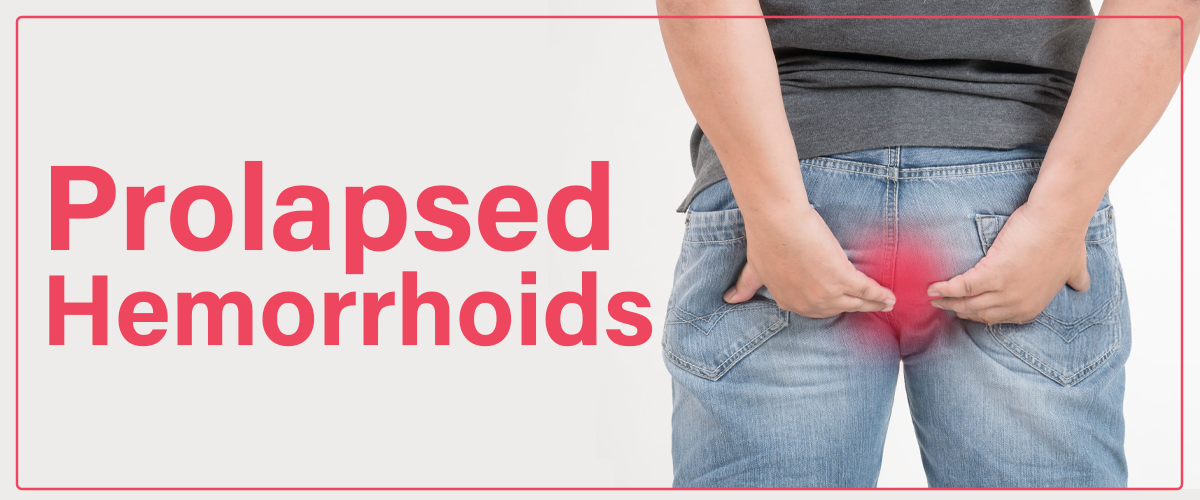
A prolapsed hemorrhoid is a painful condition when a hemorrhoid bulges outward from your anus or lower rectum, especially if they go untreated or are put under physical strain. When a vein in your anus or lower rectum swells, it is called a hemorrhoid. A hemorrhoid can become prolapsed when the tissue that holds it in place weakens. There are several possible causes and risk factors for this weakening of the connective tissue, straining during bowel movement being one. That said, prolapsed hemorrhoids are treatable, especially if diagnosed before they get enlarged or burst out. Therefore it’s important to understand its symptoms, and causes to seek timely treatment.
Make sure that lump around your anus is actually a hemorrhoid and not a tumor or any other health concern. For accurate diagnosis and treatment, contact us at +(91) 9667064100.
Understanding Prolapsed Hemorrhoid
Prolapsed Hemorrhoids usually cause pain when sitting, discomfort, bleeding and itching, and can make everyday life difficult. They may also hurt more during a bowel movement. It can even lead to formation of thrombosed hemorrhoids, a condition when a blood clot has formed within the hemorrhoid.
Based on its location, there are two types of hemorrhoids: internal and external. An internal hemorrhoid becomes prolapsed if it pushes down from the rectum and bulges out from the anus, whereas the external prolapsed hemorrhoid directly forms on the anus. While external hemorrhoids cause itching, pain or tender lumps that appear around or near the anus, internal hemorrhoids, on the other hand, are associated with symptoms like bleeding from the rectum and prolapsing, which can cause pain and discomfort.
Causes
There are some possible causes of prolapsed hemorrhoids, which are:
Symptoms
The following are the most prevalent symptoms of prolapsed hemorrhoids:
Treatment
Most prolapsed hemorrhoids will shrink and return to normal on their own, but if the hemorrhoid persists, the patient may require medication, or surgery.
Medication
Medical options available for the hemorrhoids treatment, including:
Non Surgical procedures
A prolapsed hemorrhoid that cannot be treated with more conservative treatments may need non surgical treatments or surgery to shrink, eliminate, or reduce blood flow.
Rubber band ligation: This is the most typical method of treating a prolapsed hemorrhoid. It’s a method of treating hemorrhoids that haven’t responded to medicines. To limit blood supply to the hemorrhoid, a rubber band is tied around the base of the hemorrhoid to restrict the circulation of blood. As a result of this, the hemorrhoid shrinks and falls off.
Sclerotherapy: During this procedure, a medicated injection is given into a vein that causes the hemorrhoid to shrink.
Coagulation: During the treatment option, infrared radiation is used to cut off blood supply to a vein, causing it to shrink.
Surgical Treatment
Haemorrhoidectomy (Hemorrhoid Removal): If medication or non-surgical procedures fail to treat your hemorrhoids, a surgical procedure called a hemorrhoidectomy may be required to remove them. This involves gently opening the anus to allow the hemorrhoids to be cut out. However, as the procedure is usually carried out under general anaesthetic, you won’t feel any pain.
Stapling: This is a procedure designed to produce results similar to those of banding by reducing the circulation to the hemorrhoids. It’s also often used to treat prolapsed hemorrhoids.
During the procedure, which is also carried out under general anesthetic, part of the hemorrhoid tissue is removed before ‘stapling’ the remaining tissue in place inside the bottom. This form of surgery has a shorter recovery time than traditional hemorrhoidectomy and also tends to be less painful.
Prevention
Meet Our Best Doctors
At Felix Hospitals, the best hospital for prolapsed hemorrhoids surgery, our surgeons provide the latest surgical treatment and care to the patients. Our team of highly skilled and experienced surgeons, led by Dr Ritesh Agarwal, and Dr Vishal Sharma, is dedicated to delivering the highest quality care using advanced surgical techniques. Our state-of-the-art facilities are equipped with cutting-edge laparoscopic equipment and advanced technology, ensuring precise and efficient procedures.
Conclusion
Lumps on the anus, soreness, itching, and bleeding are the most frequent symptoms of prolapsed hemorrhoids. These symptoms aren’t life threatening, but they might affect your quality of life. If you experience any symptoms, schedule an appointment.